Bioimaging REU Exposes Undergrads to Imaging Research, What Grad School is Like
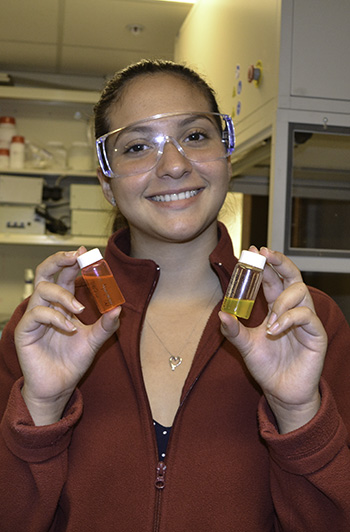
2017 Bioimaging REU undergrad, Carolyna Quiles.
July 25, 2017
In its third summer, the Bioimaging Research Experience for Undergraduates (REU) allowed ten undergraduate students to experience research on imaging. Not only did they learn about the specific area they were researching; but they acquired new skills related to imaging; gained professional skills, such as how to present their research; plus learned what graduate school is like. For some, it confirmed that graduate school/research was in their future.
According to Co-PI Andrew Smith, since the BioEngineering Department (BioE) didn’t have an REU, they felt that offering one about bioimaging, a sub-field of bioengineering, was a “great way to get people into research that wouldn't have any experiences otherwise.” They also felt it would provide students a summer opportunity related to Bioengineering compared to a standard job.
Another goal was recruiting students to graduate school “who might be on the fence about going and need some sort of inspiration to get to the next step to make that decision to go.” It appears that the REU is achieving this goal, because it has had a tremendous impact during the first two years of the program. Around 80% of the participants have gone on to graduate school; 25% (four out of sixteen) have actually come or accepted offers to come to Illinois.
In keeping with NSF’s broadening participation mandate, a major motivation for the REU is also to increase enrollment of underrepresented minorities and females in STEM:
“We do see it as like a gateway to getting underrepresented groups who might not naturally be interested in going…to the graduate level into the STEM program where it is more math heavy and more engineering focused. So that's a major motivation for us is to specifically recruit students like that,” Smith indicates.
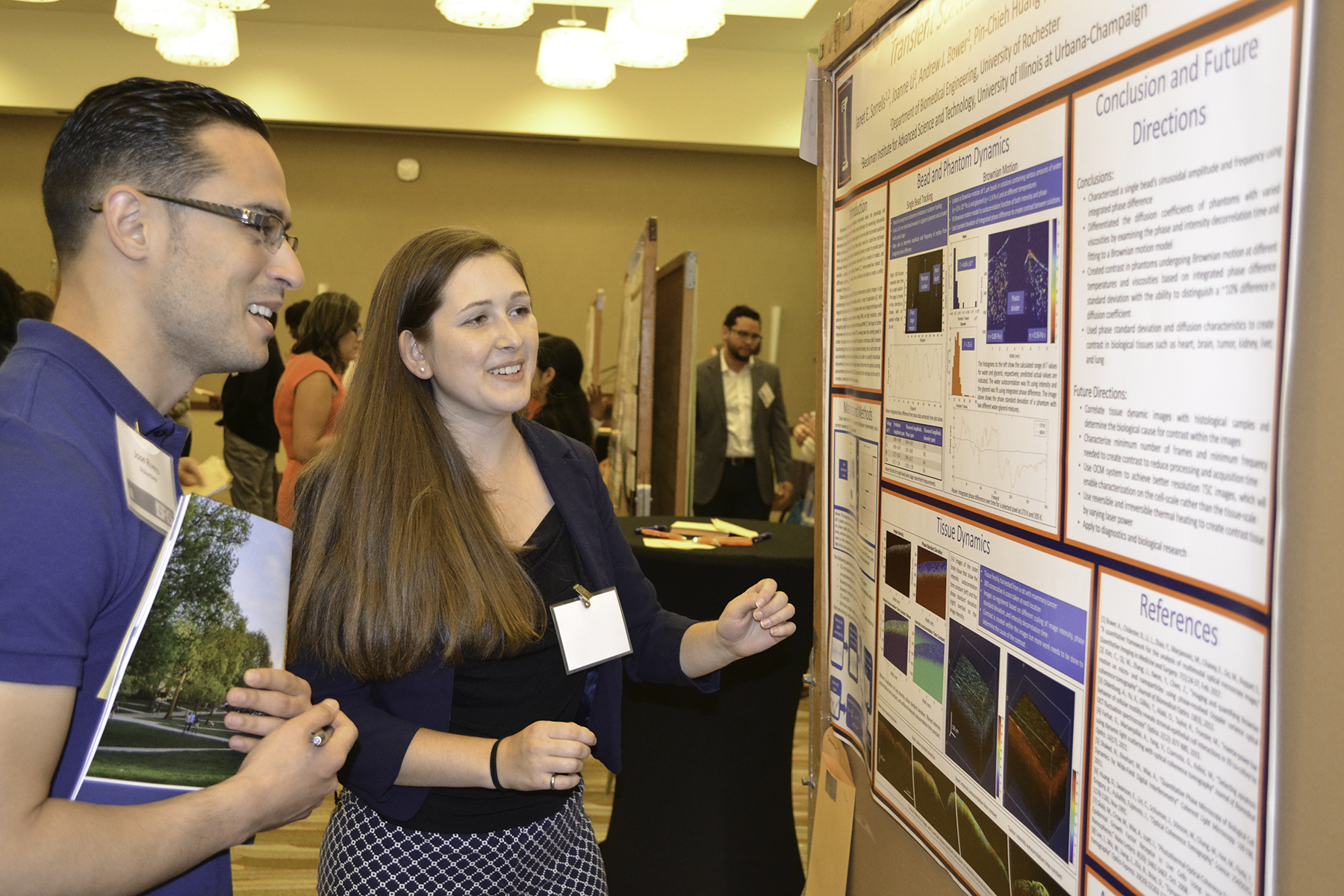
Bioimaging REU participant Janet Sorrels explains her research to a visitor at the Illinois Summer Research Symposium.
“It's to give people the experience to do research in these fields, which we think are very exciting,” Smith explains, “and to be well mentored in it so that they understand actually how to do experiments, how to analyze data they derive from the experiments, how to interpret it, the full gamut of the idea, concept all the way to data collection and interpretation—everything to do with research in respect to that.”
Obviously, one of the main goals was to expose students to what research is really like.
Students not only gained professional experience related to research, such as how to write the data up into a document, but they got to experience presenting it and and giving a scientific talk. At the end of the summer, they both gave an oral presentation and presented a poster about their research at the Illinois Summer Research Symposium at the i-Hotel. They also attended workshops about preparing one’s resume and how to apply to graduate school.
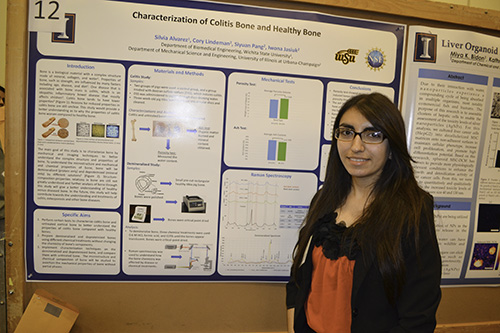
Bioimaging REU participant Silvia Alvarez at the Illinois Summer Research Symposium.
What did the REU directors hope the students would learn this summer? For one, they wanted students to “see the grand challenges of biology, bio-medicine, and clinical medicine practice and to be able to identify them, and then to tie that to a technology related to imaging.”
Specifically, they hoped students would learn what bio-imaging is and how to use it, and acquire hands-on skills related to bio-imaging at multiple scales ranging from cells and tissues to whole organisms. They also wanted students to understand the relevance and need for more complex and abstract things like math, and to tie that back into something that is useful and interesting.
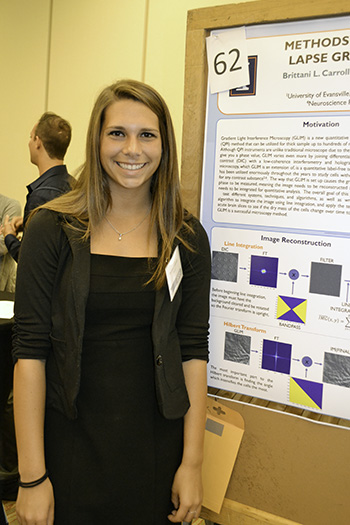 Brittani Carroll by her poster at the Research Symposium.
Brittani Carroll by her poster at the Research Symposium.“So it's to really use images as a showcase for complex math and statistics and computation, which are not really interesting to most people—so it's to make that interesting, so they get into fields like STEM fields that are very math heavy.”
What are the benefits for the students? Well of course there's the financial aspect. And while they could have earned money doing a more traditional blue collar job, during the REU they spent the summer doing something that’s more career oriented.
Another benefit for students was inspiration. “Here, they get to do something that's very much focused on their career outcomes,” Smith explains, “so hopefully this will be something that they might get inspired to go into a specific career because of this. So I think the inspiration is a big thing.”
A third benefit? It looks really good on their resume. “It looks good that they got into a program like this, and they went through the whole thing, and they could write on their resume what they did, so they have all these professional skills they could write down now that they achieved.”
Finally, the students got experience prsenting their work at the Ilinois Summer Research Symposium (see above), and can potentially present their work at a professional society meeting. According to Smith, students will apply and may be selected to go to this year’s Biomedical Engineering Society Conference in Phoenix to present a poster or oral presentation based on their work this summer.
“Getting involved in research as an undergraduate is one of the most important things to do as an undergraduate, because you don't have that opportunity after you leave an academic setting really. So learning the full concept of what science and engineering is it really starts from basic research.”
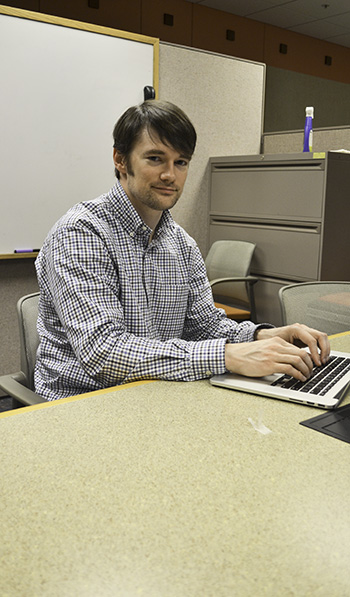
Co-PI of the Bioimaging REU, Andrew Smith.
Smith adds that once one gets into industry or medical practice, everything's applied and generally based on profit. But in an academic setting, things are more holistic, and things could start just from a concept and it's not driven by finances initially.
“So it's a really unique opportunity for students to get involved in research at that level because you could completely open your mind to any concept, and just an idea can spin off a whole field potentially…You get a very open ended experience...it can be life-changing for some students.
Smith reports being in something similar to an REU as an undergraduate. “That was what really changed my focus…once I got into research, it was like everything made sense to me.” He reports learning “fundamental concepts like thermo-dynamics, things that are not that interesting because you can't see how they're applied. But once you get into research, you can see that that's the tie-in between all these really fundamental concepts that you learn into actual practice and to use. And so…for me, that changed my career perspective.”
Smith finds it rewarding to see the REU students change over the course of just several weeks.
“When they actually get into a lab or when they start analyzing data, you see things start to click…And then they also get inspired to just learn as much as possible because then they realize they can actually apply even fundamental concepts. A book might not tell you why you might need to know how to do integrals, but then you can see it in practice when it's actually what people do day to day in basic research.
Carolyna Quiles
One of the 2017 crop of Bioimaging undergrads for whom the REU had a significant impact was Carolyna Quiles, a rising senior studying biomedical engineering with a minor in psychology at the University of Virginia.
Quiles participated in the REU because its theme was aligned with what she wants to do: “I am definitely interested in bioimaging. Back at my school, I haven’t had the chance to go into it at all. This was a new experience. It’s been awesome, truly amazing.”
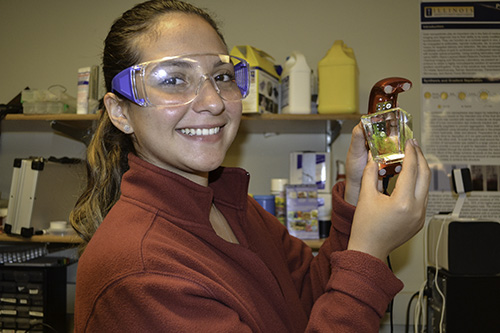
Bioimaging REU participant Carolyna Quiles.
Quiles’ research in Rohit Bhargava's lab involves “printing sacrificial scaffolds that will be coded in a bio-gel in order to study or mimic tumor microenvironments. Right now we are just printing and seeing what works best.”
Might what Quiles is doing now enable tumor research down the road? She says, “Yes, for sure. That’s the plan!”
While she’s learned a lot about her field, she’s also learned about possible career directions. “There’s so many different paths you can take as a biomedical engineer. I’ve also learned a lot about grad school and how that all plays out.”
She doesn’t really have any of the details planned out yet regarding her future career; however, she does want a job where she can use her engineering background to “be creative and solve problems in the field of medicine,” then adds, “I’m definitely interested in devices.”
While the experience hasn’t necessarily impacted her career choice, it has impacted her inclination to go to graduate school. “I think this experience has opened my eyes to what grad school is like, and has made me want to apply. If I had any doubts about going to grad school or not, this experience has definitely pushed me towards pursuing that.”

Carolyna Quiles presenting her poster at the Illinois Summer Research Symposium.
Quiles has also discovered how bioimaging might be useful in the future. She says it’s important “because you want to be able to visualize what you’re doing. Whether you end up working with nanotechnology or nanoparticles, you always want to have some sort of knowledge and practice in bioimaging so that you can visualize, analyze, and get data from your samples.” She says it also produces “nice pictures to share with the scientific company.”
Quiles definitely thinks there’s research in her future. “If I go to grad school (which I’m pretty sure I am), that’s kind of what grad school is all about.”
Might Illinois be in her future?
“Possibly!” she admits. “I really love it here.”
The REU hasn’t just been about work, though. “I’ve also made a lot of good friends,” she says, “which is great. My cohort is filled with great, amazing individuals, so that’s also been really good.”
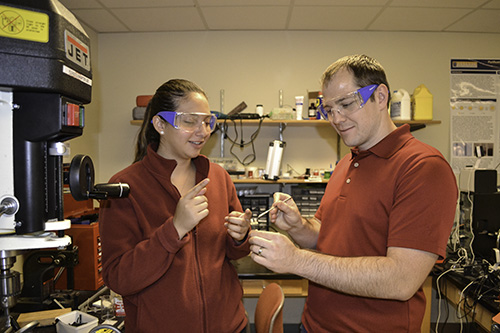
Bioimaging REU participant Carolyna Quiles (left), and her grad student mentor, Troy Comi.
Regarding her overall impression of the REU, Quiles says, “This has truly been a really, really great experience. Not just in the educational realm, but also networking, social, education and academics. I think everything has come together very nicely. I’m having a really good time, and I’m really looking forward to the other half of the experience.”
Troy Comi, Quiles’ mentor, whose research involves developing artificial models of cancer development using the 3D printer, acknowledges that he signed up to mentor an undergrad to pay it forward.
“I had a lot of great mentors when I was an undergrad, so I thought it would be good to give back to the community and help Carolyna this summer with her project.”
Regarding the benefits of the REU for the participants, he asserts, “Undergraduate research is a great opportunity to take what you learn in classes and apply it to the real world. Also, you get to try out working in a lab before you maybe go on to grad school or med school, where you basically do it full-time.”
Janee Phillips
Janee Phillips is a rising senior studying bioengineering at North Carolina A&T State University. Her experience in the Bioimaging REU taught her what she does and doesn’t want to pursue, careerwise:
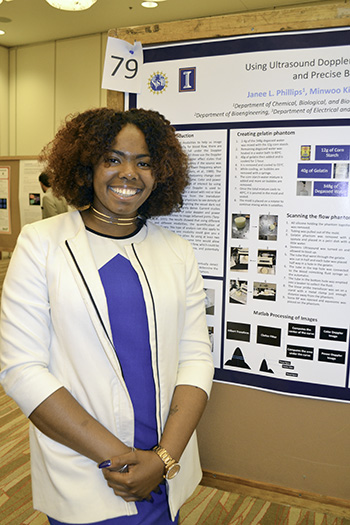
2017 Bioimaging REU undergrad, Janee Phillips, by her poster at the Illinois Summer Research Symposium at the iHotel.
“So I’m definitely thinking about pursuing my Ph.D., which involves a lot of research. And this ten weeks was really intense, and that’s just a little piece of what grad school is. So, even though it was really intense, I was happy that I was actually able to produce. So that’s kind of what grad school is about. You go through stress your whole four years, and your fifth year you do your thesis, and you’re like, ‘I did it!’
One thing Phillips learned during the REU was that she intends to go to grad school, but not in bioimaging. “Maybe not so much bioimaging. This project was a lot to understand. And bioimaging isn’t only ultrasound technology; it’s MRI, PET-CT, I’m not sure that’s the direction I want to take. So, this kind of helped me distinguish, ‘Ok, what do I want to do for grad school?”
“I used ultrasound in order to image blood flow, because we want to be able to get an estimate for slow rate, We’ll eventually be able to determine, ‘Ok, how many nutrients is tumor getting?’ in order to say, ‘Ok, this is how fast the tumor will grow.’ And we can make the correct plan of action.”
Javier DeJesus
Javier DeJesus, a rising senior studying mechanical engineering at the University of Puerto Rico at Mayaguez, indicates that he joined the Bioimaging REU because in Puerto Rico, “In order to use high- tech instruments, you need to be in the top of the group. Coming here has allowed me to use novel instruments. I came to be exposed to the instruments.”
Some of the cutting-edge instruments he’s used included a new microscope called SLIM, which allows the user to create high-resolution images without using fluorescent tags. He also used a data technique called CLARITY, in which the liquids are removed from the organs and made to look clear to take images. “Neither one of those exist in Puerto Rico,” says DeJesus, “so I came here to use them.”
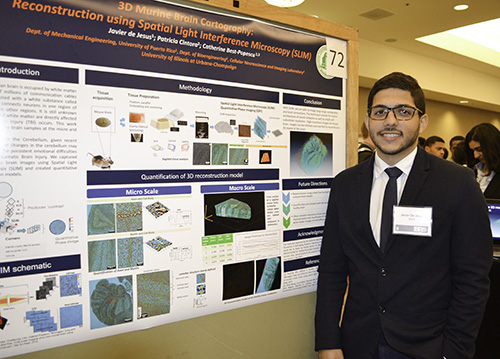
Bioimaging REU participant Javier DeJesus presenting his research at the Illinois Summer Research Symposium.
In addition to using CLARITY to image, DeJesus also gained some clarity about his future career plans. “After this experience, I am thinking about going to med school because I would like to keep developing new devices to help improve the quality of a person’s life…My hopes are to apply for biomechanical engineering to do medical devices and robotics but also to med school and see what happens there.”
DeJesus claims that “The biggest benefit this program allowed for us is to connect with other persons. For example, I tried to take advantage of the opportunity and talk to other professors and see what they are doing and see if I can work with them in the future… I met professors from robotics programs that allowed me to go to their research and see how they do and what they do and that was pretty nice.”
Than Huynh
A rising junior in bioengineering at Illinois, Than Huynh, shares why he participated in the REU:
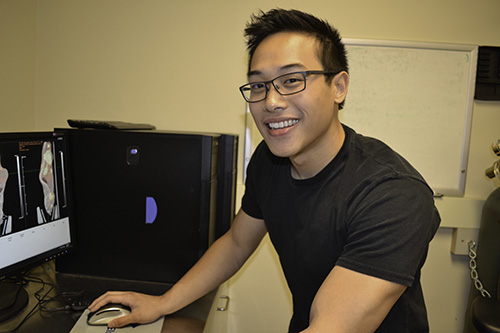
Bioimaging REU participant Than Huynh.
“I thought this REU served a really clear purpose, and that was to demonstrate potential in imaging and the advancements that could be made in the field. I thought that was a very cool perspective for me as an undergrad, seeing that this is a new and evolving field.”
Huynh, who intends to pursue an MD/PhD, thinks the PhD portion will be in bioengineering with a focus in imaging, so the REU was relevant to his career plans. “They play hand in hand,” he admits.
Huynh, who worked in Professor Lawrence Dobrucki’s imaging lab during his sophomore year, indicates that he decided to continue his research during the summer. Huynh reports that they are trying to develop new probes for diagnosing illnesses like cancer and diabetes, which they then image on a PET-CT (positron emission tomography) scanner. They also monitor angiogenosis, or the formation of new blood vessels, using the PET-CT and laser Doppler.
Huynh says he definitely will be doing more research down the road. “Since I'm trying to pursue an MD/PhD…a majority of my time will be in research, and it will be hopefully to engineer new imaging modalities or improving current ones.”
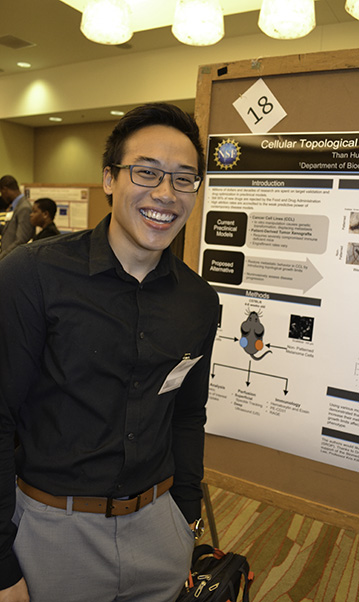
Bioimaging REU participant Than Huynh by his poster at the Symposium.
The specific disease that he’d like to focus on? Diabetes.
However, since the REU is a 10-week-long program, he had to choose something on a smaller scale. So his summer research involves comparing mechanically-activated melanoma cells to non-mechanically-activated ones. They learned that restricting melanoma cell shapes to certain shapes of the cells makes them exhibit stem-cell-like properties, such as the ability to renew themselves and to differentiate to more tumor-progressive cells.
“If we set these limits on them and we instill them to these certain shapes, they become more aggressive. From that we can essentially create a more accurate model for other research labs across the world to test their new drugs to address aggressive tumors.”
Huynh reports that he also learned a lot about research professionally this summer: how to write research and how to compose, reading literature and interpreting it as well as more methods: how to culture cells and the patterning that goes on behind it. Plus, he’s learned how to use PA (photoacoustic imaging), a new imaging modality as well. He’s also learned methods to analyze the images they obtain. He says most of it goes on behind the scenes during the year, but now he’s gotten to actually see it.
Huynh’s mentor, Jamila Hedhli, a Bioengineering graduate student, says mentoring her student has helped her grow as well. “I think it's very important for graduate students or even advisers like the PI, to mentor just for you to demonstrate and show other candidates how are things being done and that is an evaluation for yourself as well as the person you are mentoring.”
She also finds sharing all they’ve accomplished to be quite rewarding. “And I really think it's a fulfillment when you're relaying everything that you've learned all of these years to someone else and seeing them accomplishing what you do and even more than that.”
Hedhli has only positive things to say about her mentee, Huynh: “I actually think he will be a promising new scientist. I see a lot of brightness in his future, and he is hardworking, and it will show off one day.”
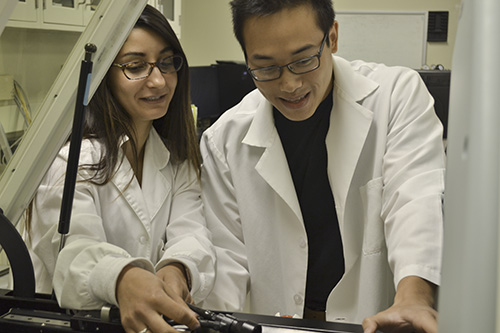
Bioimaging REU participant Than Huynh (right), and his grad student mentor, Jamila Hedhli.
Author/Photographer: Elizabeth Innes, Communications Specialist, I-STEM Education Initiative
More: 2017, Biology, Research Experiences for Undergraduates, REU: Bioimaging, Summer Research Programs
For additional articles about the Bioimaging REU, see:
- Program Provides Undergrads with Research Experience, Professional Development
- Bioimaging REU's Matt Kavanaugh Experiences Cancer Research at Illinois
- Wendy Reyes Learns Life Skills—and to Like Research—in Bioimaging REU
- Summer Research Experience Exposes Undergrads to Bioimaging at Illinois
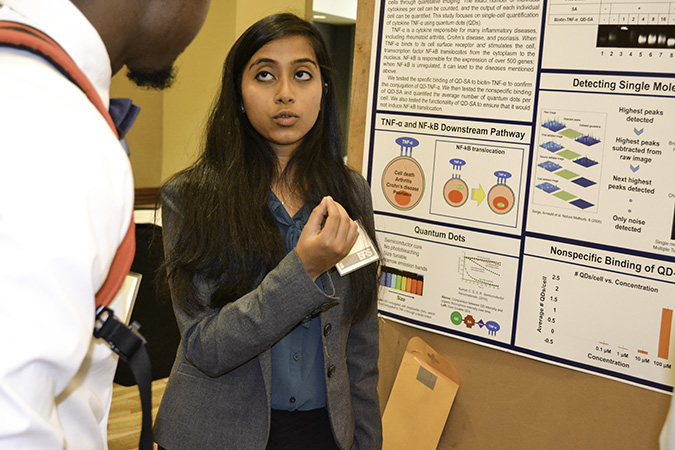
Bioimaging REU participant Prerana Jaikumar explains her research to a fellow REU student at the symposium.













.jpg)
















